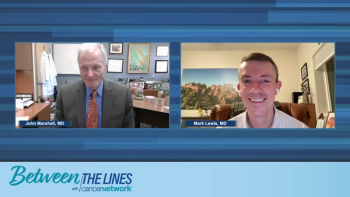
Panelists discuss how circulating tumor DNA (ctDNA) serves as a promising biomarker for early detection, treatment monitoring, and recurrence surveillance in patients with colorectal cancer (CRC).

Your AI-Trained Oncology Knowledge Connection!


Panelists discuss how circulating tumor DNA (ctDNA) serves as a promising biomarker for early detection, treatment monitoring, and recurrence surveillance in patients with colorectal cancer (CRC).

Panelists discuss how the BESPOKE study’s innovative design, carefully selected efficacy end points, and rigorous methodological approach aim to evaluate personalized therapeutic interventions with unprecedented precision.

Panelists discuss how the BESPOKE trial enrolled a diverse cohort of patients with varying demographic profiles, disease stages, comorbidities, and treatment histories to ensure comprehensive representation for personalized medicine approaches.

Panelists discuss how BESPOKE trial results demonstrate significantly improved disease-free survival rates in patients with negative circulating tumor DNA (ctDNA) status compared with those with detectable ctDNA, underscoring its potential as a powerful prognostic biomarker.

Panelists discuss how circulating tumor DNA (ctDNA) clearance rates during and after adjuvant chemotherapy (ACT) in the BESPOKE trial provide critical insights into treatment efficacy and may serve as an early predictor of long-term patient outcomes.

Panelists discuss how minimal residual disease (MRD) status, as detected through circulating tumor DNA analysis, can guide personalized treatment decisions by identifying patients who may benefit from intensification of adjuvant therapy and those who could safely undergo de-escalation of treatment regimens.

Panelists discuss how SWOG 80702, a large-scale randomized clinical trial, employed a robust factorial design with clearly defined efficacy end points, including disease-free and overall survival, while enrolling a diverse patient population with stage III colon cancer to evaluate optimal adjuvant therapy duration and the impact of celecoxib.

Panelists discuss how the efficacy data from SWOG 80702 demonstrated that shortened duration of adjuvant chemotherapy (3 months vs 6 months) yielded comparable survival outcomes while significantly reducing treatment-related toxicities, challenging previous standard-of-care approaches for patients with stage III colon cancer.

Panelists discuss how tumor-informed circulating tumor DNA (ctDNA) testing offers a personalized molecular surveillance strategy that can revolutionize colorectal cancer management through earlier detection of recurrence, real-time monitoring of treatment response, and potential for therapy de-escalation in patients with negative results.

Panelists discuss how adopting a patient-centric approach with comprehensive education about circulating tumor DNA (ctDNA) testing empowers patients with colorectal cancer (CRC) to make informed decisions about their surveillance strategy while advancing personalized care pathways for the future.

Panelists discuss how circulating tumor DNA (ctDNA) testing serves as a complementary tool to traditional imaging in challenging colorectal cancer cases, offering molecular-level insights that can detect disease recurrence earlier, resolve ambiguous radiographic findings, and inform treatment decisions when conventional assessment methods yield inconclusive results.

Panelists discuss how research on circulating tumor DNA (ctDNA) testing in colorectal cancer requires careful consideration of standardized collection protocols, analytical validation, clinical utility assessment, integration with existing biomarkers, and longitudinal monitoring to establish its role in personalized treatment decision-making.